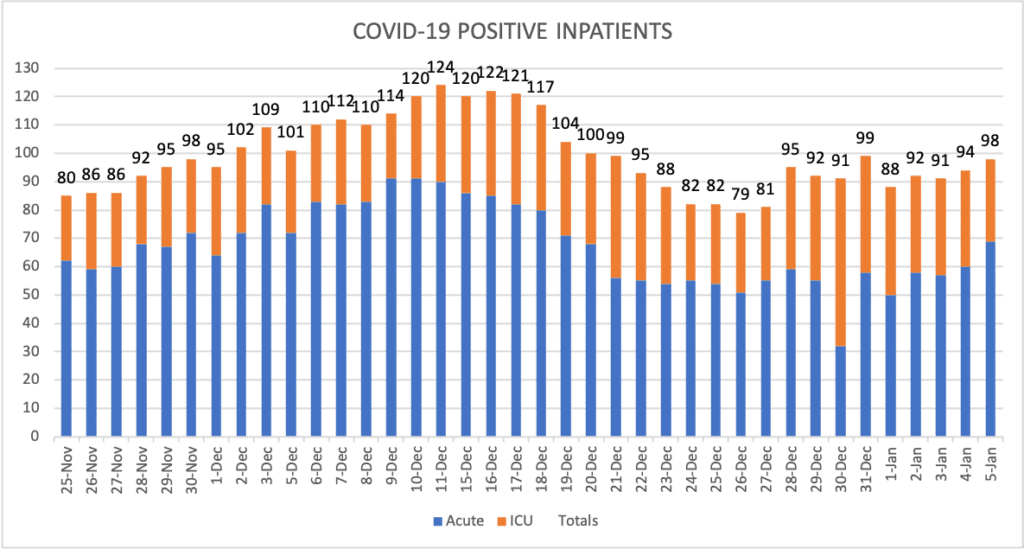Data Snapshot
UW Medicine Hospitals:

King County: The county reported 334 new positive cases and 5 new deaths on Jan. 4.
Washington: The state reported 246,376 cases and 3,482 deaths as of Jan. 3.
United States: The CDC reports 20,558,489 cases and 350,664 deaths as of Jan. 4.
Global: WHO reports 84,233,579 confirmed COVID-19 cases and 1,843,293 deaths as of Jan. 5.
*Numbers update frequently, please follow links for most up-to-date numbers.
UW Medicine COVID-19 Vaccine Distribution Update
Total vaccinated: 13,988
· Employees: 11,474
· Community members: 2,514
COVID-19 Literature Report
COVID-19 Literature Situation Report is a daily (M-F) newsletter put together by the Alliance for Pandemic Preparedness that provides a succinct summary of the latest scientific literature related to the COVID-19 pandemic.
Key Takeaways: COVID-19 Literature Situation Report Jan. 4, 2021
- The Moderna vaccine mRNA-1273 showed 94.1% efficacy at preventing COVID-19, including severe disease, in a peer-review publication from the phase 3 trial. Efficacy was similar across key secondary analyses, and all severe cases of COVID-19 occurred in the placebo group. More.
- 19% of asymptomatic people who had household exposure to COVID-19 and had negative laboratory test results for 7 days after the index patient’s symptom onset experienced symptoms or received positive test results in the following week, suggesting that quarantines shorter than 14 days may pose some risk of onward transmission. More.
- Compared with real-time reverse transcription–polymerase chain reaction (RT-PCR) testing, the Sofia antigen test had a sensitivity of 80.0% and specificity of 98.9% among symptomatic people. Accuracy was lower (sensitivity 41.2% and specificity 98.4%) when used for screening of asymptomatic people. More.
COVID-19 Literature Surveillance Team, is an affiliated group of medical students, PhDs and physicians keeping up with the latest research on SARS-CoV-2 / COVID-19 by finding the newest articles, reading them, grading their level of evidence and bringing you the bottom line.
Read the latest report: Jan. 4 | Daily COVID-19 LST Report.
Listen to the latest podcast: Dec. 30 | COVID-19 LST Podcast.
UW Medicine in the News
MSN: Picking your nose could spread Covid-19, experts warn
Featuring: Paul Pottinger, Allergy & Infectious Diseases
“Researchers from the University of Washington School of Medicine in Seattle urged people to stop digging for gold in the nostrils as it could bring the virus directly into their bodies. Infectious disease specialist Dr. Paul Pottinger said that people are putting themselves at risk as not only are they spreading viruses such as Covid-19, flu, and the common cold onto everything they touch after picking their nose, but they’re also ‘transferring germs from your fingertips into the nose, which is the exact opposite of what you want.’ The coronavirus can enter the body through the mouth, nose and eyes, and while the nostrils have defense systems to keep pathogens out, nose-picking increases the risk of viruses entering the nose.”
KOMO News: Vaccines could help prevent new strains of coronavirus, UW expert says
Featuring: Ali Mokdad, IHME
“No cases of the new variant have been reported in Washington state but according to Mokdad, it may already be here, we just haven’t been testing enough to find it. ‘In the United States we need to have a surveillance for the genetic typing of this virus, and we need to stay on top of it, not only in the United States but elsewhere as well,’ he said. Mutations can make vaccines less effective, he said. ‘Until now the vaccine is still very effective, which is very good news, but we should not allow this virus to mutate and we should not allow our vaccine not to work against this virus,’ said Mokdad. The key to stopping new strains, according to IHME, is to vaccinate and to do it quickly. In the U.S., as many as three million flu vaccines can be given in a day. According to Mokdad, the U.S. could give as many of six million COVID-19 vaccines a day once there are enough for everyone.”
Spokane Public Radio: Covid Vaccinated People Encouraged To Share Vaccine Side Effects With CDC
Featuring: Ellen Schur, General Internal Medicine
“Some Washington health care workers who have received their first Covid vaccine shot say they’re participating in a study that’s tracking how they respond to the vaccine. The V-Safe program from the Centers for Disease Control allows health care workers to report any side effects they suspect could be from the vaccine. Dr. Ellen Schur from UW Medicine’s Diabetes Institute says she downloaded a smart phone app that allows her to share data and fill out surveys from the CDC. “What the V-Safe program is going to do is send me little text check-ins every day for the next week and then less frequently. I’ll give them any information about side effects that I’m having. Then, over time as these data accumulate and when later waves of people are being vaccinated from the general public, we’ll be able to refine our information that we give to our patients,’ she said. Information such as what vaccine recipients can expect to feel in the hours and days after they get their shots. ‘I feel very privileged to have gotten the vaccine and I also feel a sense of duty as a physician and a researcher to continue to our knowledge about this vaccine since we are among the first people, outside of a clinical trial, to receive it,’ Schur said.”
Tweet of the Week
A single-dose strategy allowing more people to get vaccinated might help curtail #COVID19 pandemic sooner. Anna Wald & Ruanne Barnabas @UWMedicine @uwdgh write @AnnalsofIM https://t.co/Q5RhotlQcl
— UW Medicine Newsroom (@uwmnewsroom) January 5, 2021

